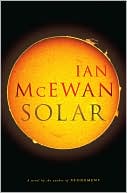 Solar
Solarby Ian McEwan
I think the answer to the question above is, "Yes." Others will disagree. For this reason, I expect Ian McEwan's latest, Solar, to be a polarizing novel. On the one hand, you've got Mr. McEwan's considerable literary talent. On the other hand, you've got an unlikable protagonist, a whole lot of physics, and a comic novel. And if there's anything more subjective than humor, I don't know what it is.
Solar is a satirical look at the life of Nobel Laureate in Physics, Michael Beard. As the novel opens, 50-something Michael is married to 30-something Patrice. This, his fifth marriage, is on the rocks and his brightest, most promising days are long behind him. While the reader will want to find redeeming qualities in Michael, his character follows a trajectory from ridiculous to reprehensible to repugnant. "He was sufficient, self-absorbed, his mind a cluster of appetites and dreamy thoughts. Like many clever men who prize objectivity, he was a solipsist at heart, and in his heart was a nugget of ice..."
McEwan is smart in the way he relays the story. It's told episodically, opening in 2000, then jumping ahead to 2005, and finally to 2009. This draws the reader in. What has happened since we've seen Michael last? What are the repercussions of his behavior? Has he learned any lessons? Is he a better person? I would begin each section full of these questions and eager for answers.
So, can you write a likeable book about an unlikeable character? I found myself reflecting on John Kenney Toole's Pulitzer Prize-winning novel A Confederacy of Dunces and its unlikely hero, Ignatius J. Reilly. Michael Beard, while less of a complete buffoon, is not cut from entirely different cloth. Readers who can laugh at his foibles and maintain at least some empathy will enjoy this novel the most.
The other thing I mentioned above is physics. It's Michael's career, and McEwan doesn't shy away from what will be challenging territory for some readers. Think of it as a foreign language. When I read The Yiddish Policeman's Union, I found myself wondering how readers with no grasp of Yiddish would handle the book. As it turns out, they handled it just fine. I am fortunate to have a reasonable working vocabulary in both Yiddish and physics; consequently my enjoyment of these novels was merely enhanced. Like Chabon, McEwan isn't talking down to his readers. There is no unnecessary exposition. McEwan has given his unlikeable character some very admirable skills and placed him in a position to do good on a grand scale. Can that redeem him?
Solar is social commentary. And it is a novel of ideas. It's the type of comedy that feels slightly mean and not always that funny. Throughout the novel, Michael Beard has set a lot in motion. The ending of the novel was what it had to be. Some readers won't appreciate this work. Others will hate how it ends. Ultimately, for me, the joy of reading McEwan's prose, of following his flawed character, and of seeing where the story would take me made this odyssey a pleasure.
No comments:
Post a Comment